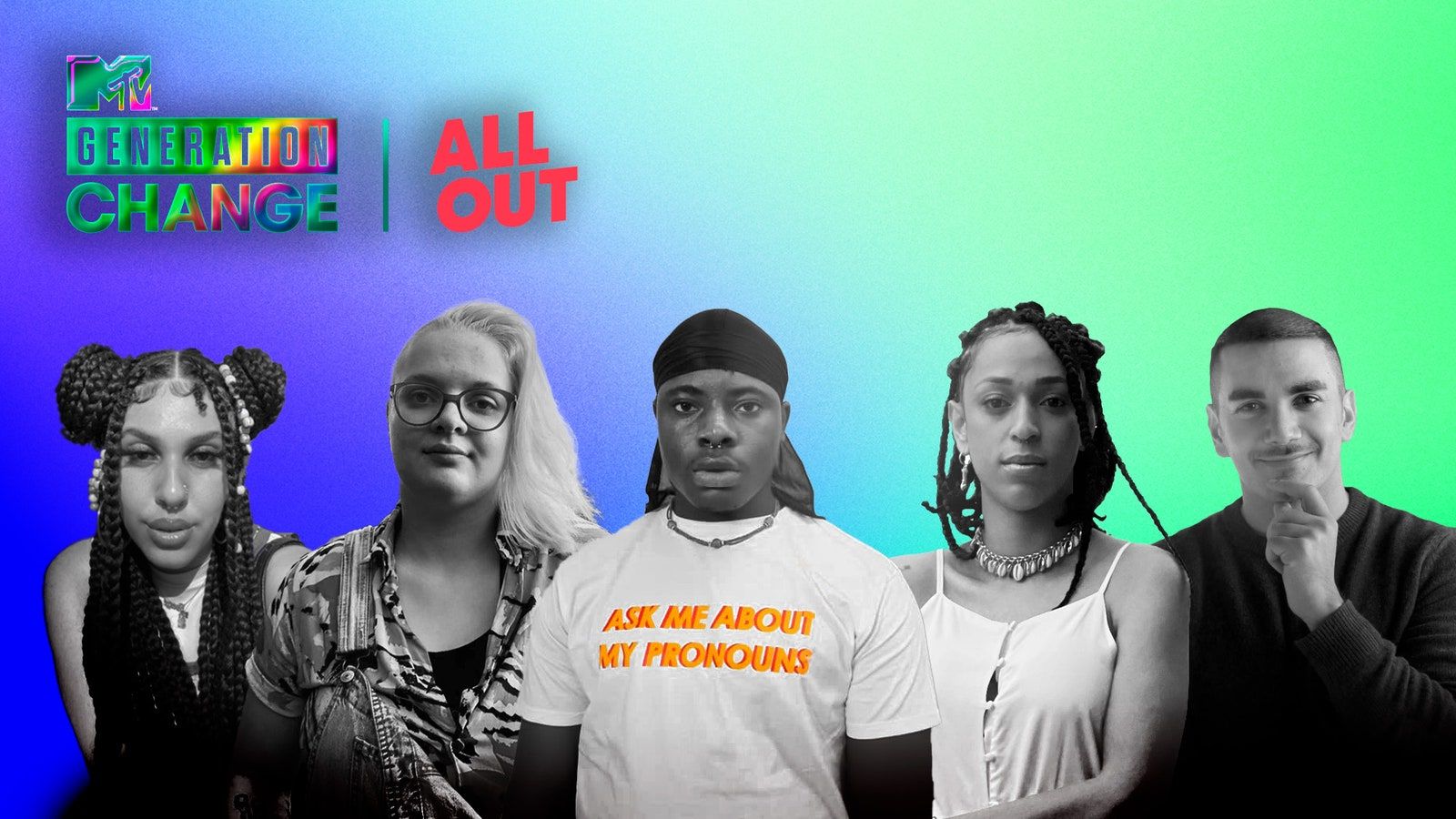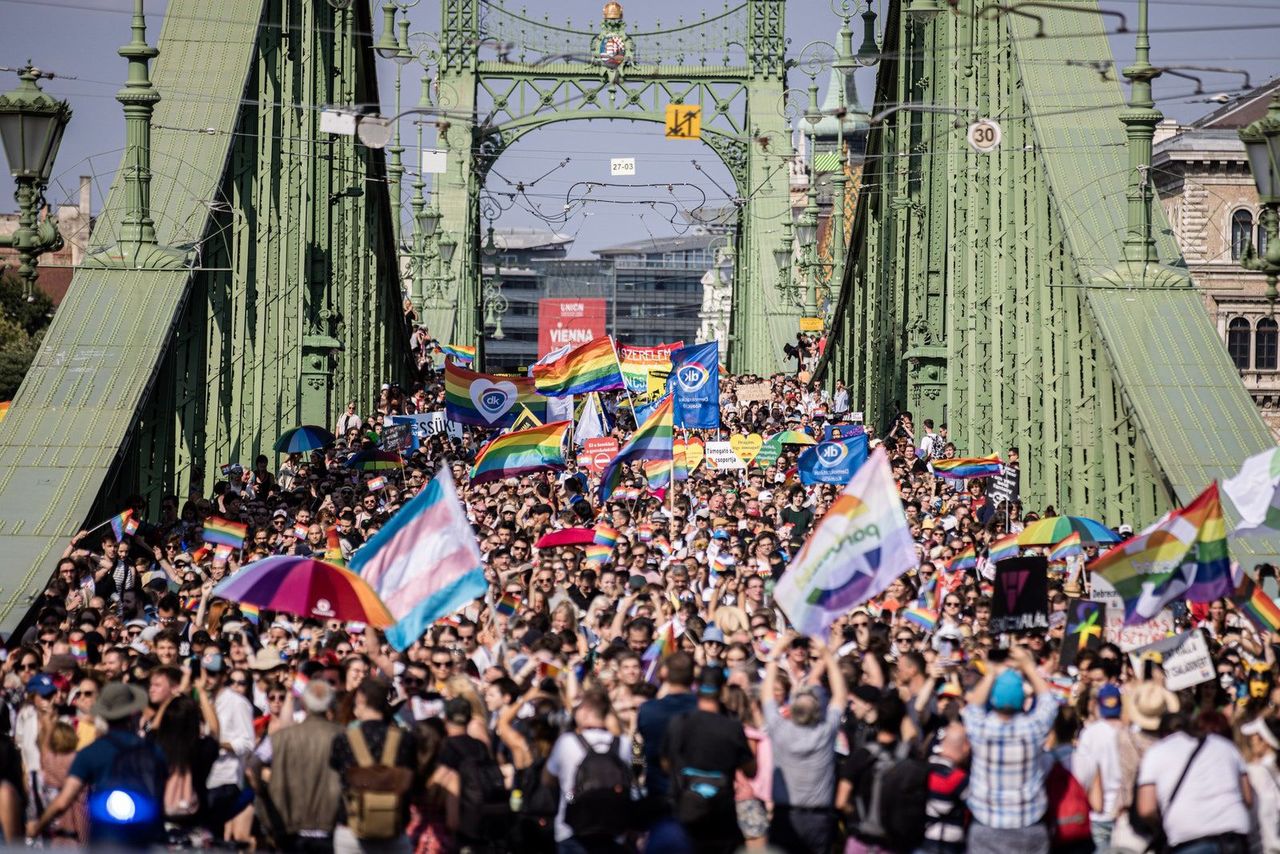
Meet the Young, Queer Activist Fighting for LGBTQ+ Rights in Hungary
26-year-old activist Viktória Radványi didn’t know she was queer when she first started volunteering with Budapest Pride, an organization that provides LGBTQ+-centric programming, resources, and community in Hungary.
She had recently moved to Budapest from the Hungarian countryside, a small town of around 18,000 where the primary activity was going to pubs. She was searching for excitement, for belonging. Then, she happened to see that Budapest Pride was looking for volunteers, and she sympathized with what queer people in the country were up against.
“In retrospect, it makes a lot of sense [that I was queer]. Like why didn't I choose, like, Greenpeace?” she tells Teen Vogue. “I really loved being there. It was a very warm feeling. I was asking every couple, where did you meet? I thought, ‘I'm being a very good ally.’ That's what happened, and then it completely changed my life.”
Viktória explains all of this while laughing over a coffee in Budapest, the day before she’ll speak at the MTV EMAs as one of five LGBTQ+ activists named as Generation Change honorees. In partnership with the advocacy group All Out, MTV named Viktória, Amir Ashour, Matthew Blaise, Sage Dolan-Sandrino, and Erika Hilton as passionate young people working to serve their communities, a group of leaders striving to make a world that’s more equal for all.
Years after she first answered a call for volunteers, Viktória is now a board member for Budapest Pride. She gave a moving speech at the EMAs on November 14. “My dearest Hungarian LGBTQ siblings, this award goes to all of you,” she said. “We must make our voices heard. Let’s take care of each other, let’s self-organize, and let’s get out and vote together. Never except the notion that you should tolerate violence and discrimination.”

The LGBTQ+ focus of this year’s EMAs was intentional. In June, Hungary’s current government passed an anti-LGBTQ+ law that conflates homosexuality with pornography and pedophilia. It bans content that promotes homosexuality and gender transition discussion to people under the age of 18, including in school sex education. The law has been met with global outrage; Reuters reported that Hungary rejected calls from the European Commission and many EU lawmakers to repeal the bill. It followed anti-LGBTQ+ legislation in 2020 that effectively banned same-sex couples from adopting children and prohibited trans people from altering their legal name and/or gender identification.
In response to these discriminatory laws, Budapest Pride and other organizations in the country have bolstered their advocacy efforts by partnering with other NGOs. “We all have very limited capacities, so we now have three work groups that work on the censorship law but also on the ban on legal gender recognition, and the ban on adoption,” Viktória says. “We try to create legal cases, which is very, very hard. Because this censorship law has not been [widely enforced].”
The scope of the law is broad and vague, which can stoke fear and precautionary action from those who are afraid of ramifications, whether it’s a fine or a smear campaign. “Among other things, they prohibit sex educators from instructing students about LGBTQ sexuality and ban television stations from airing content “popularizing” LGBTQ identity outside the hours of 10 pm to 5 am. … But what counts as “popularizing” LGBTQ identity, and what sorts of art count as being targeted at kids?” Vox’s Zack Beauchamp asked in a story from June 2021. Because the threat might not seem “real” to some, the enthusiasm for repeal wanes, according to Viktória. “There's this notion that, ‘Oh, this is not even a problem, because the state is not enforcing this censorship law. It's only a communication technique. It's an election technique, so we don't really have to deal with this, because it's not being enforced,'" she says. "But it's still hurting people's lives.”
Anti-LGBTQ+ sentiment in the government came to a head last year, after an inclusive children’s book went viral when Dóra Dúró — a politician and deputy leader of the far-right Our Homeland Movement — publicly shredded it. The book is titled Meseország Mindenkié, translated as “A Fairytale for Everyone,” and is published by Hungarian lesbian group Labrisz. It reimagines classic fairy tales with characters who don’t often see themselves in these stories: Roma people, Jewish people, queer and gender nonconforming people, those who have disabilities. After the shredding, it became a bestseller.
Hungarian Prime Minister Viktor Orbán took the opportunity to give a backhanded statement addressing the controversy in a radio interview. “Hungarians are patient and tolerant of this phenomenon. We also take provocation well,” he said. “But there is a red line that cannot be crossed. Leave our children alone!”
That’s when, Viktória says, they knew something bad was coming: “From October till May, we were just waiting.” She adds, “In the middle of June, they added censorship of school content like educational content that promote or mention homosexuality, and promote sex changes [to an anti-child abuse law].” But in the media, the language around the legislation remained the same — a child protection law, not an “anti-LGBTQ+ law.” The phrasing is especially important for the opposition parties in an election year. “Even though they're opposition parties, a lot of their voter base isn't necessarily very pro-LGBTQ,” she says. “We were really afraid that they're going to vote yes on this bill, because if they vote no, then the governing party can say that you love pedophiles.”
For Viktória, the school curriculum aspect is particularly harmful. “When I went to school, in biology class, there was one sentence about trans people. We heard that they exist, and we heard that there are certain surgeries that sometimes they go under. It was very dehumanizing, but it was there,” she remembers. “Now, it's all gone.”
It’s right out of the playbook for eroding LGBTQ rights, All Out executive director Matt Beard says. “Probably the best example going back 30, 40 years is in the UK, and a law called Section 28 under the Thatcher regime which did actually precisely the same as this,” Beard explains. “It bans the positive representation of any LGBT+ content in any schools. There's a famous quote from Margaret Thatcher where she said, with derision, ‘Children … are being taught that they have the inalienable right to be gay.’”
“A more recent example is Russian anti-gay propaganda, which really caused a huge close down of queer civil society in Russia. Our Russian partners constantly have to battle with that in order to be able to do their work,” Beard continues. “It's a long, long lineage. There's a long history. It works. It works because there are people in the middle. We're not talking about diehard Nazis, we're talking about people who are just small-c conservative, not really that interested in politics, but it's a massive dog whistle, a massive trigger. ‘Oh, gays are after children? Let's close down their rights.’"
The law also extends to media, which is where MTV comes in. No company had yet made a dramatic, large-scale overture to test the boundaries and consequences of the law. MTV made LGBTQ+ rights the focus of this year’s EMAs ceremony; massive advertisements covered the city in the lead-up to the event. And in addition to the Generation Change speech, the EMAs featured numerous queer people on the red carpet — including Family is Family creators Ádám Hanol and Marton Pál, who are fighting for adoption rights — and performances from artists like Yungblud and Kim Petras that were exceptionally queer in the most jubilant way possible.
“Already, like, government officials are making comments about, ‘Hmm, MTV might be provoking the Hungarian government,’” Viktória laughs. “Like, yes. They made it quite clear.” (So far, MTV hasn’t received any fines for airing the ceremony.)
Meanwhile, Viktória’s work and that of her colleagues at Budapest Pride has continued on. She cares deeply about the organizational structure, and making sure Budapest Pride is as feminist and anti-racist as they declare it to be on paper. That has meant an ongoing reckoning with who's missing from the table, as well as instituting protocols that support new members, fight against groupthink, and equitably divide responsibilities. (For example, rotating notetaking and moderation duties, since “usually women or less-advantaged people tend to be the ones who do more administrative work,” Viktória explains.) It’s also a challenge to support the mental health of volunteers and people who work for Budapest Pride, as well as the people who find community there. She believes mental health has to happen on a community level when you deal with structural injustices — it’s not a personal problem.
That mental health consciousness goes for Viktória’s own work, too. When she thinks about her future in activism and advocacy, she thinks about burnout, and how to avoid it. Mandatory vacation is helpful. So is challenging the expectations of productivity culture.
“What's really, really crucial for social justice movements, especially for those who work in hostile environments, is not to embrace this idea that your results define you, or your productivity define you,” she says. “Because there's so many things that need to be done that can really burn you out very quickly. That means you have to let a lot of things go. It's also very hard not to normalize this level of hate and smear campaigns that we're getting. But you have to speak to the fact that what you are going through is way beyond normal. You need to create structures that allow you to remain healthy and intact and to be able to work sustainably for a long time. It's not going to do any good to anybody if you burn out in five years. Then all your knowledge, all your experience will not be passed on to other activists.”
Just a couple weeks after the anti-LGBTQ+ law went into effect in early July, Budapest Pride held their annual Pride march. Organizers thought that queer and trans people might be afraid to come to Pride, given the mood in the country. In a typical year, they have around 20,000 attendees, Viktória notes. This past July, that number jumped to 35,000.
“It was a beautiful day,” Beard says, one that “charges up your batteries” and reminds you of everyone who is rooting for you.
“We were standing there and the crowd just kept on coming,” Viktória adds. "We experienced a great increase in the number of allies who came out to the pride march. That definitely was heartwarming. I think it sent a big message to the community that there are a lot of people standing up for you.”












